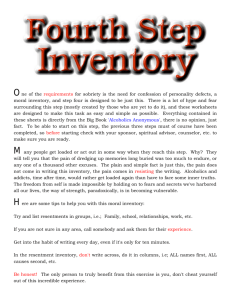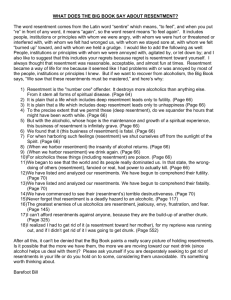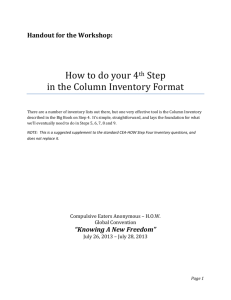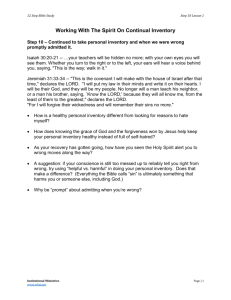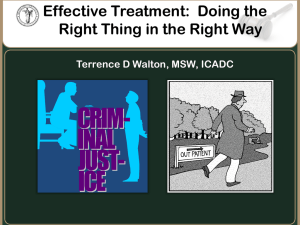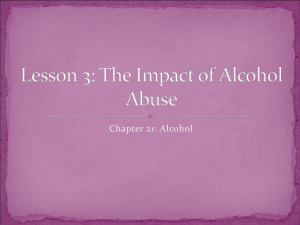STEP STUDY OUTLINE AND ASSIGNMENT SHEET
advertisement
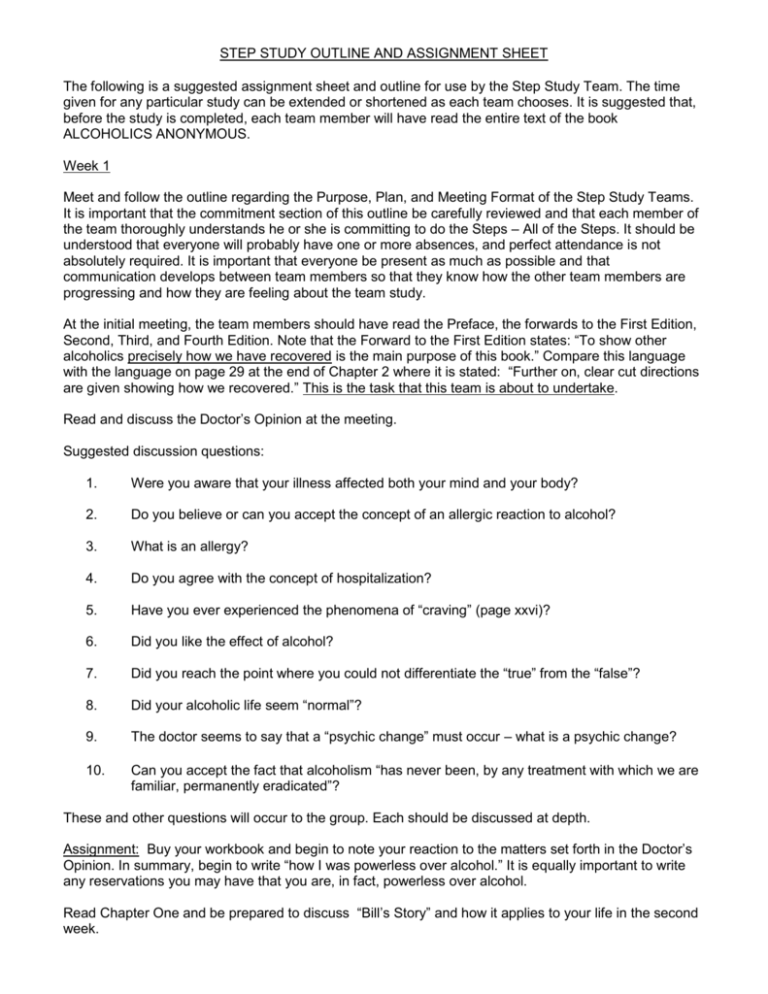
STEP STUDY OUTLINE AND ASSIGNMENT SHEET The following is a suggested assignment sheet and outline for use by the Step Study Team. The time given for any particular study can be extended or shortened as each team chooses. It is suggested that, before the study is completed, each team member will have read the entire text of the book ALCOHOLICS ANONYMOUS. Week 1 Meet and follow the outline regarding the Purpose, Plan, and Meeting Format of the Step Study Teams. It is important that the commitment section of this outline be carefully reviewed and that each member of the team thoroughly understands he or she is committing to do the Steps – All of the Steps. It should be understood that everyone will probably have one or more absences, and perfect attendance is not absolutely required. It is important that everyone be present as much as possible and that communication develops between team members so that they know how the other team members are progressing and how they are feeling about the team study. At the initial meeting, the team members should have read the Preface, the forwards to the First Edition, Second, Third, and Fourth Edition. Note that the Forward to the First Edition states: “To show other alcoholics precisely how we have recovered is the main purpose of this book.” Compare this language with the language on page 29 at the end of Chapter 2 where it is stated: “Further on, clear cut directions are given showing how we recovered.” This is the task that this team is about to undertake. Read and discuss the Doctor’s Opinion at the meeting. Suggested discussion questions: 1. Were you aware that your illness affected both your mind and your body? 2. Do you believe or can you accept the concept of an allergic reaction to alcohol? 3. What is an allergy? 4. Do you agree with the concept of hospitalization? 5. Have you ever experienced the phenomena of “craving” (page xxvi)? 6. Did you like the effect of alcohol? 7. Did you reach the point where you could not differentiate the “true” from the “false”? 8. Did your alcoholic life seem “normal”? 9. The doctor seems to say that a “psychic change” must occur – what is a psychic change? 10. Can you accept the fact that alcoholism “has never been, by any treatment with which we are familiar, permanently eradicated”? These and other questions will occur to the group. Each should be discussed at depth. Assignment: Buy your workbook and begin to note your reaction to the matters set forth in the Doctor’s Opinion. In summary, begin to write “how I was powerless over alcohol.” It is equally important to write any reservations you may have that you are, in fact, powerless over alcohol. Read Chapter One and be prepared to discuss “Bill’s Story” and how it applies to your life in the second week. Week 2 Chapter One, “Bill’s Story”. Discussion Questions: 1. Did you ever ask, “Was I crazy”? (page 5) 2. Did you ever feel the remorse, horror, and hopelessness of the next morning? (page 6) 3. Did your mind ever race uncontrollably? (page 6) 4. Did you ever seek oblivion? (page 6) 5. Did you feel lonely? (page 8) 6. Did you feel fear? ((page 8) 7. What was your reaction to religion, church, and God? (page 10) 8. Note what happened to Bill’s prejudice against “their God” when he began to apply his own concept of God (page 12). Did you know that “nothing more was required of me to make my beginning” than willingness or a willingness to believe? 9. Doesn’t Bill essentially take the first through the eleventh Step at this time? (page 13) Notice how Bill was instructed to find God’s Will and pray. (page 13) 10. Has your common sense become “uncommon sense” in this manner? (page 13) Bill really takes the twelfth step on page 14, doesn’t he? The program worked in all of Bill’s affairs. (page 15) 11. What was of particular significance to you in this chapter? What did you find that you could not agree with or which you could not accept? Assignment: Read Chapter Two and be prepared to discuss next week. Continue to write how you are powerless over alcohol and begin to consider what you can truly “manage” in your life. As thoughts occur to you whether you can or cannot manage life and in particular, your life, write down your thoughts in your notebook. Week 3 Chapter Two, “There is a Solution”. Suggested discussion questions: 1. What parts of the chapter can you apply to your life? 2. What is your reaction to the membership of Alcoholics Anonymous? Did your alcoholism “engulf all whose lives touched the sufferer’s? (page 18) What was their reaction? Do you see how you can reach another alcoholic? (page 18) 3. Note on page 20 the book answers the question, “What do I have to do?” Have you been asked the question on page 20 by yourself or other people? What were the answers? 4. From your examination of yourself in the past weeks and your reading of this chapter, are you a “real alcoholic”? (page 21) If not, why not? Discuss this with your team. 5. Did you have control over alcohol, did you do absurd and incredible and tragic things while drinking? Were you a Jekyll and Hyde? These questions and observations on page 21 may help you in answering the questions you have been writing about, having to do with your powerlessness over alcohol. 6. Why did we drink the way we did? (page 22) Why do we take that one drink? Why can’t we stay on the water wagon? What has become of the common sense and the will power that he still sometimes displays with respect to other matters? Did you ask yourself these questions? Had you lost the power of choice described on page 24? Have you ever said, “What is the use anyhow”? (or something similar) There is a Solution (page 25) The Great Fact is just this and nothing less: That we have had deep and effective spiritual experiences. Read aloud and understand Appendix II and the rest of this paragraph because it is an outstanding summary of what happens in the program. Our alternative to the solution is to “go on blotting out the consciousness of our intolerable situation as best we could or to accept spiritual help”. (page 25) Note that Appendix II is referred to again on page 27. Assignment: Read Chapter Three. Prepare to discuss how it applies to your life. Week 4 Chapter Three, “More About Alcoholism”. Suggested discussion questions. 1. Did you have the “great obsession”? (page 30) Did you know that it was an illusion? 2. Did you try to control your drinking, can you diagnose yourself? (page 31) Has your writing in your book listed those things you attempted to do to control your use of alcohol and your failures? 3. Do you have a reservation of any kind or any lurking notion that you will some day be immune to alcohol? (page 33) 4. Can you identify with the mental states that precede a relapse into drinking, do you understand that the mental states are the crux of the problem? (page 35) 5. Do you understand why any actual or potential alcoholic will be absolutely unable to stop drinking on the basis of self-knowledge? (page 39) Note the doctor’s reaction to alcoholism on page 43. Read aloud the solution at the bottom of page 43. Assignment: Read and be prepared to discuss Chapter Four next week. By now you should have completed writing most of your memories about why you are powerless over alcohol and why your life is unmanageable. If you are having difficulty with these problems, discuss this with the team members and/or your sponsor. Week 5 Chapter Four, “We Agnostics”. Suggested discussions questions: 1. Do you accept the fact that you have only two alternatives if you are alcoholic – alcoholic death or to live on a spiritual basis? (page 44) 2. Have you lacked power to manage life? (page 45) Note that the “main object of this book is to enable you to find a Power greater than yourself which will solve your problem”. 3. Have you had honest doubts and prejudices about God? (page 45) What has been your reaction to the word “God” – what will He look like, what will it be like when you find Him, and where did you get these ideas? Had you abandoned the idea of God entirely? (page 45) 4. Are you willing to lay aside your previous beliefs or prejudice and express even a willingness to believe in a power greater than yourself? 5. What is your concept of God? (page 46) 6. Do you now believe or are you even willing to believe that there is a power greater than yourself? (page 47) Do you recognize that when you can say “YES” to this question that you are “on your way”. (page 47) Note that the book once again refers to Appendix II at this point. What is it that Appendix II says that is indispensable? 7. Have you been open-minded or have you been obstinate, sensitive and unreasonably prejudiced about discussions about God? (page 48) 8. What reservations did you have when you read this chapter? Have you been biased and unreasonably prejudiced about the realm of the spirit? (page 51) Did your ideas work – will the God idea work? (page 52) 9. ARE YOU REALLY READY TO FEARLESSLY FACE AND ANSWER THE PROPOSITION THE “EITHER GOD IS EVERYTHING OR HE IS NOTHING. GOD EITHER IS OR HE ISN’T. WHAT IS OUR CHOICE TO BE? (page 53) Do you believe that “when we drew near to Him, He disclosed Himself to us”! (page 57) Remember what it said on page 28? If what we have learned and felt and seen means anything at all, it means that all of us, whatever race, creed, or color are children of a living Creator with whom we may form a relationship upon simple and understandable terms as soon as we are willing and honest enough to try. Assignment: In your notebook write what you can believe about a Power greater than yourself. On another page write what you cannot believe about God. As you go forward from this point, it is those things which you believe or which fit into your conception of God which you will be using and can be comforted in knowing that “our conception, however inadequate, was sufficient to make an approach and to effect a contact with Him”. (page 46) Read and be prepared to discuss (pg 58 – 63) in Chapter Five in the Big Book next week. Week 6 Chapter Five, “How it Works”. Discuss the materials contained in this chapter from page 58 to page 63 (i.e. through the part which concludes Step 3). Suggested discussion questions: 1. Do you question whether you are capable of being honest with yourself? (If you do – you’re not) Note the state of mind you’re asked to have when you start the Steps – honesty, fearlessness, thoroughness, and a willingness to go to any length. 2. What do half measures avail us? 3. Are you convinced that a life run on self will can hardly be a success? (page 60) Can you see the effects of self-centeredness in your life? How have you been self –centered? List examples in your workbook and discuss them with the group. 4. Did you know that you could not reduce self-centeredness much by wishing or trying on your own power? (page 62) 5. Are you willing to make the decision set forth at the bottom of page 62? Note the promises that follow the taking of Step 3 as described at the top of page 63. Are you willing to take this step? Many groups at this point commit one to the other that they are going to take this step and recite the prayer that is set forth on page 63 together. Assignment: Continue to list places where you can see that you are self-centered in your workbook. Begin the 4th Step inventory by reading material for week 7. Prepare a Grudge List. Week 7 THE FOURTH STEP INVENTORY: Discuss the 4th Step background material and the Grudge List. Many readers find the instructions for Step 4 contained in the book “Alcoholics Anonymous”, confusing and complex. This paper is written to reflect the experience of certain members of the fellowship in taking this step in accordance with the instructions given in the Big Book, including the inventory, the analysis, and the study and prayer suggested by the book have found it to be an exciting and rewarding experience. This experience is available to anyone who will complete each of the following steps to the best of his ability in the order which they are given. Perfection is not required, but a good effort involving honesty, open-mindedness and willingness is essential. The Time and Purpose of Step Four Perhaps the greatest promise by the program of Alcoholics Anonymous is that God, as you understand Him, will do for you what you cannot do for yourself. This promise carries with it the obvious condition that you must do what you can. When you have made the decision required by Step 3, the Big Book warns us “though our decision was a vital and crucial step, it could have little permanent effect unless at once followed by a strenuous effort to face, and be rid of, the things in ourselves which have been blocking us (from God) … so we had to get down to causes and conditions. Therefore, we started upon a personal inventory”. The specific instructions for taking this step are contained on page 64 through page 72 of the book “Alcoholics Anonymous”. These instructions should be read carefully at this point. What do we seek? The inventory is described as a "fact finding and fact facing process”. We are said to be seeking the truth about ourselves and to honestly take stock of our lives. We are to search out the flaws in our makeup which caused our failure. Throughout the book “Alcoholics Anonymous” it is stated that self, selfishness, and self-centeredness were the root of our troubles. Being convinced that self, manifested in various ways, was what had defeated us, we considered its common manifestations. These common manifestations are grouped in three categories – resentment, fear, and sex relationships. Each of these common manifestations is treated separately in the inventory. RESENTMENTS – The Number One Offender From these thoughts or mental attitudes “stems all forms of spiritual disease”. We are instructed to list all people, institutions or principles with whom we were angry or had resentments. What is a resentment? Webster’s Dictionary defines “resentment” as “indignation or ill-will felt as a result of a real or imagined offense”. Webster’s then refers the reader to the word “anger” and gives other examples of this thought or feeling, which includes rage, fury, ire, wrath, resentment, and indignation. These words denote varying degrees of displeasure from anger, strong, intense and explosive to the longer lasting resentment – ill-will and suppressed anger generated by a sense of being wronged or being wrong. In summary and broadly defined, we are dealing with a negative or unpleasant thought or feeling caused or generated by the real or imagined act or failure to act of a person, institution, or principle. Week 7 (Cont) Persons, institutions or principles may need some explanation. Remember you are a "person” and your action or failure to act may very well cause you to think or feel bad (generally, this is called “guilt”). Institutions are any group of people, authorities, companies, governmental agencies, or other such organizations. A principle is a basic truth or law. Many of these basic truths or laws have and do offend us. EXAMPLES; Alcoholism is an incurable, progressive disease. Honesty is the best policy. As you give, you receive – (each of us suffers the consequences of his own actions – there is no free ride). When you are disturbed, no matter what the cause, there is something wrong with you. A life lived without self-examination is not worth living. (Socrates) ASSIGNMENT: PREPARING THE GRUDGE LIST With the foregoing instructions in mind and before proceeding any further with this inventory, a list should be prepared of the people, institutions, and principles which have or do cause you to have a resentment, as defined above. Certain points should be remembered. If you can remember the resentment, you should list it, even though you think you are “over it”. Go back through your life, “nothing counts but thoroughness and honesty”. A review of family albums, school annuals and the like may help you to be thorough. Some people write a short autobiography of their life to assist them in their memory. Do not concern yourself with whether or not you should or should not have the feeling – just make the list and nothing more at this point. Throughout the taking of Step 4 and at times thereafter, you will recall other people, institutions, and principles which have caused these negative thoughts and feelings. You can add to this list at anytime, but do not spend too much time worrying about how complete the list is, simply do the best you can over a reasonable period of time. (perhaps a week) Week 8 ANALYSIS OF RESENTMENTS When you have completed your list and not before, each resentment must be analyzed. Step 4 will mean very little unless you come to understand each resentment and learn from it. The following procedure has proven helpful in this understanding and analysis: Purchase a spiral notebook and open it so that you have a blank page on either side of the wire spiral. With a ruler or straight edge, divide each of these pages vertically so that when both pages are divided, you have a total of four columns. Turn the page to repeat this process until you have divided several pages in this manner. The columns on each page should be labeled as follows: Column 1: Column 2: Column 3: Column 4: “Name” “Cause” “Affects” Should be left blank for the time being. Take the first name from your “Grudge List and write it in Column 1 on the first page. Week 8 (Cont) In column 2, write a few words which describe each and every event or circumstance you can recall which causes you to resent the person named in column 1. This is a very important part of the analysis – we learn from SPECIFIC events, not from general complaints (for example, we learn very little from the complaint that “he was always lying” – but learn much from a specific “he told me he wasn’t married”). Opposite each of the events you in column 2, write down why this event or circumstance bothered you. Specifically ask yourself: a. Did it affect my self-esteem (the way I think of myself or what others think of me)? b. Did it affect my pocketbook? c. Did it affect my ambition (what I wanted or needed)? d. Was one of my personal relationships affected or threatened? e. If the effects described in a thru d above do not accurately describe the effect the event had upon you, write a few words to explain how you felt and how you were effected. Complete the analysis of each of your resentments arising out of each of the events before going further with the inventory. STUDY & PRAYER: Read and study the Big Book from the paragraph that begins at the bottom of page 65 through the second paragraph on page 67. Ask yourself these questions about each resentment and each event causing it and write a brief paragraph reflecting your answers:: 1. Having determined who was at fault, did I go further in my study of this event? 2. Did I try to retaliate, fight back, or run? What was the result? Did it help? 3. Is it clear to you that a life which includes resentments leads only to futility and unhappiness? Has the resentment ever benefited you in any way, or have you squandered hours thinking about the resentment? Do you realize and understand that these thoughts separate you from the “Sunlight of the Spirit” (God)? Do you know that these thoughts will lead you to the insanity of the first drink, and with us, to drink is to die? 4. Do you understand that through our thoughts and reactions to people, places and things, the world and its people really dominate us? Do you understand that until we progress beyond the point of simply stop blaming ourselves and others, there can be no growth or solution? 5. Can you forgive? 6. Do you recognize that other people have the same problem with life that you have had and many of them are spiritually sick? 7. Honestly pray the 4th step prayer – God, help me show __________, the same tolerance, pity, and patience that I would cheerfully grant a sick friend. __________ is a sick man/woman, how can I be helpful to him/her? Save me from being angry. Thy will be done. From this point forward we try to avoid retaliation or argument. Assignment: Read Week 9 – Be prepared to discuss. Week 9 THE BEGINNING OF GROWTH As noted earlier, it is a spiritual axiom that when I am disturbed, no matter what the cause, there is something wrong with me. Now that you have listed and understood the resentment and how it affected you, having stopped blaming or “putting out of your mind the wrongs others have done”, you can now look for your own mistakes and learn from them. Take the following action: At the top of the 4th column on each page, insert the words “My faults and mistakes”. For each person, institution or principle and for each event, ask yourself: 1. Where have I been selfish, dishonest, self-seeking, and frightened? 2. Where was I to blame? Write down your faults as revealed by the above questions in the 4th column opposite each person, institution, or principle and event. When you have concluded all of the instructions with respect to resentments, and not before, proceed to “fear”. Assignment: Read from the third paragraph on page 67 of the Big Book through the first three full paragraphs on page 68. Read week 10 and follow the directions. Week 10 FEAR – “Touches every aspect of our lives” Take the following action: “FEAR” Defined – Webster’s Dictionary defines “fear” as a feeling of alarm or disquiet caused by the expectation of danger, pain, disaster or the like (being found out, being known for what you know or think you are). It is said that the driving force in the life of most alcoholics is the self-centered fear that we will lose something we have or that we will not get something we think we need or want. Listing of Fears – On a page following the section on resentments, write a short description of each fear that you have experienced. You have already asked yourself about the impact of fear on your resentments. We now complete the list of times, places, and circumstances which evoke this feeling (i.e. snakes, bugs, heights, women, men, etc.) Analysis of Fear – Having listed each of the fears, we should write a short analysis of these fears in our effort to understand them. It is said that each of those fears sets in motion chains of circumstances which brought about or caused us misfortunes, can you cite examples where this occurred? Why do we have each fear? Was it because self-reliance failed? What should we now rely upon, if not ourselves? 1. 2. 3. 4. When did this fear occur? Why do I have this fear? Did you feel you could handle the situation as you saw it? If you could not handle the situation who would you rely upon? STUDY & PRAYER: When our fears have been listed and the above questions answered, the book “Alcoholics Anonymous” gives us the solution to fear in the second and third paragraphs appearing on page 68. We are also given a short prayer in which we ask “Him to remove our fears and direct our attention to what He would have us be”. This solution and prayer should be directed toward each of our fears. Assignment: Read in the Big Book from the last paragraph on page 68 through the end of Chapter Five. Read week 11 and follow the directions. Week 11 Sex Relationships Inventory Read aloud from the Big Book the last paragraph on page 68 through the end of Chapter 5. Scope of Inventory – This portion of the inventory is conducted by clearly discussing sexual relationships. However, in the last sentence of the last paragraph ending on page 70, it states “we have listed the people we have hurt by our conduct and we are willing to straighten out the past if we can”. This sentence indicates a broader view of our relationships with each of the important people in our lives, as well as sexual relationships. Preparing a list of Relationships – Following fears in your inventory book, you should list the names of persons to be studied. These should include both sexual and other relationships, including family, business, and friends, etc. With respect to each person named on your list of relationships, write a short paragraph which answers the following questions – remember deal with specific events: 1. Was I selfish in this relationship? 2. Was I dishonest in this relationship? 3. Was I inconsiderate in this relationship? 4. Whom did I hurt? 5. Did I arouse jealousy 6. Did I arouse suspicion? 7. Did I arouse bitterness? 8. Was I at fault? 9. What should I have done? STUDY & PRAYER – Through study and prayer, we seek to shape sane and sound ideals for our future sex life and our relationships. Whatever our ideals turn out to be, we must be willing to make amends for past wrongs, providing we do not bring about still more harm in so doing. In prayer and meditation we ask God what we should do about each specific matter, and we are told the right answer will come if we want it. On page 70 in the first paragraph, we are given instructions on how to proceed toward our ideal. In summary, we are told to “pray for the right ideal, for guidance in each questionable situation, for sanity, and for strength to do the right thing”. In these troublesome areas, we are told to throw ourselves into helping others. Assignment: Reread the last two paragraphs of Chapter Five. It is also helpful to read Chapter Four in the 12 Steps & Twelve Traditions at this point. Have you left anything out of your inventory? Have you failed to list any event or subject the memory of which causes you to be uncomfortable? If so, you should write it down now. CONGRATULATIONS!!! YOU HAVE COMPLETED STEP FOUR!!! Week 12 STEP FIVE Find someone to take the fifth step with (Probably your sponsor) – Set a Date. Read page 71 through the first full paragraph on page 75. Assignment: Read & Study Chapter 6, “Into Action” Week 13 Chapter 6 “into Action. Discuss page 72 through page 75. Has everyone had a good experience with this step? Are there reservations about doing the fifth step and if so, what are they? Have you skimped on the program at this point? Each team member will do a fifth step on one item from the inventory from each section. Assignment: Read Chapters Six and Seven in the 12 Steps & 12 Traditions. Week 14 Chapters 6 & 7 in the 12 & 12. Discuss these chapters along the lines you have previously discussed the earlier chapters in the book “Alcoholics Anonymous”. Particularly, you should attempt to itemize and list those defects of character which you have recognized stand in the way of your usefulness to your fellows. Which defects of character do you have which do not stand in the way of your usefulness to your fellows? Discuss willingness and humility and what they mean in context with these steps. Assignment: Next week be prepared to discuss the material on page 76 through page 84 and read Chapter 8 & 9 in the 12 & 12. Week 15 Discuss the material you have read. Do you have misgivings about these steps? (page 76) Do you feel diffident about going to some of these people? What is your real purpose? (page 77) Is timing important in this step? Can you approach the people on your eighth step list in a helpful and forgiving spirit? (page 77) (See pages 66 – 67)). Do you recognize that nothing worth while can be accomplished until you clean your side of the street? (page 78). Is it important that you be praised for your ninth step efforts (page 78)? Do you understand the importance of losing your fear of creditors? (page 78) Have you discussed any criminal offenses you may have committed and which may still be open with your sponsor? If not, you certainly should do so. (page 79) Do you understand how your ninth step may harm people? (page 79) Have you studied your domestic troubles and the harm that may have been caused in these areas? Do you understand the importance of not creating further harm by creating further jealousy and resentment in a “tell all” session? (page 81) What does Bill mean when he says that the spiritual life is not a theory – we have to live it? (page 83) Do you see that in making the ninth step you should be sensible, tactful, considerate and humble without being servile or scraping? (page 83) Are you experiencing the promises set forth on page 83 and 84? Assignment: Note at this point the book assumes that you made a list of people you had harmed when you did your fourth Step Inventory. If this has not been done, you should certainly make such a list at this point. Read and be prepared to discuss the balance of Chapter Six. Week 16 What are the specific instructions outlined for the taking of Step 10? What do we watch for? Note that “by this time sanity will have returned – we will seldom be interested in liquor”. (page 86) Is this the sanity referred to in Step 2? What is the proper use of the will? (page 85) What is the suggestion for taking the 11th Step on a daily basis? What do you watch for? Do you practice this step on a daily basis? Do you follow the procedure outlined on page 86 and 87 regarding your daily morning meditations and the way you proceed through the day? Has your attitude changed since you studied the chapter “To the Agnostics”? Assignment: Read the chapter “Working With Others”. Week 17 Read and discuss “Working With Others” at this meeting. What are the step – by – step requirements for a 12th step? Have you ever tried this? Share your experience with the group/ In cases where the alcoholic has not responded, have you worked with his family? Did you offer them your way of life, and what results did you have in this situation? Do you believe that you should “burn the idea into the consciousness of every man that he can get well regardless of anyone? The only condition is that he trust in God and clean house”. Is this the basis of the statement that this is a “selfish program”? Is it really a selfish program in the true sense of those words? Chapter Eight, “To Wives, Chapter Nine, “The Family Afterwards, Chapter Ten, To Employers, and Chapter Eleven A Vision for You, are all chapters designed to teach you how to practice these principles in all of your affairs. These chapters contain many spiritual truths which apply to all of us and should be read. Your group may decide whether or not to discuss one or more of these chapters or to conclude the step study. A reading of the last portion of the book on page 164 is a fitting way to end your step study team. Haven’t you really had the benefit of a contact with those who wrote this book? Don’t you know now where you should really rely? Assignment: Find some other members of Alcoholics Anonymous and do this step study with them.
